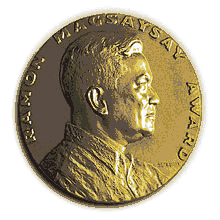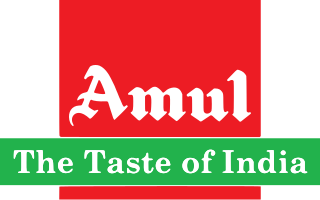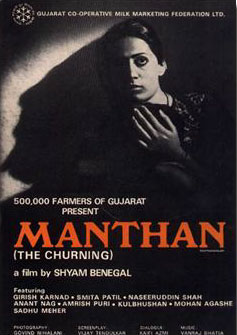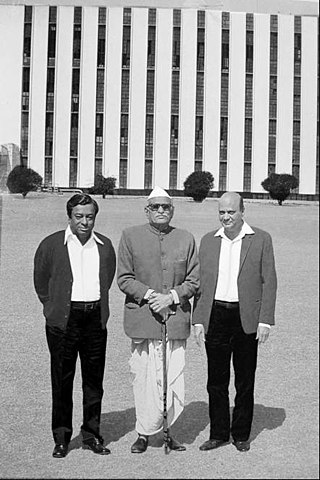
The Ramon Magsaysay Award is an annual award established to perpetuate former Philippine President Ramon Magsaysay's example of integrity in governance, courageous service to the people, and pragmatic idealism within a democratic society. The prize was established in April 1957 by the trustees of the Rockefeller Brothers Fund based in New York City with the concurrence of the Philippine government. It is often called the "Nobel Prize of Asia".

Amul is an acronym of the Indian Multinational cooperative society named Gujarat Milk Marketing Federation based in Anand, Gujarat. It is under the ownership of Gujarat Cooperative Milk Marketing Federation Limited, Department of Cooperation, Government of Gujarat. It is controlled by 3.6 million milk producers.

Verghese Kurien was an Indian dairy engineer and social entrepreneur who led initiatives that contributed to the extensive increase in milk production termed the White Revolution.

Anand is the administrative centre of Anand District in the state of Gujarat, India. It is administered by Anand Municipal Corporation. It is part of the region known as Charotar, consisting of Anand and Kheda districts.

The National Dairy Development Board (NDDB) is a statutory body set up by an Act of the Parliament of India and an Institution of National Importance. It is under the ownership of the Ministry of Fisheries, Animal Husbandry and Dairying of the Government of India. The main office is in Anand, Gujarat with regional offices throughout the country. NDDB's subsidiaries include Indian Dairy Machinery Company Ltd (IDMC), Mother Dairy and Indian Immunologicals Limited, Hyderabad, NDDB Dairy Services, NDDB Mrida Ltd., NDDB CALF Ltd. The Board was created to finance and support producer-owned and controlled organisations. Its programmes and activities seek to strengthen farmer cooperatives and support national policies that are favourable to the growth of such institutions. Cooperative principles and cooperative strategies are fundamental to the board's efforts.

Anand District is an administrative district of Gujarat state in western India and whose popular nickname is Charotar. It was carved out of the Kheda district in 1997. Anand is the administrative headquarters of the district. It is bounded by Kheda District to the north, Vadodara District to the east, Ahmedabad District to the west, and the Gulf of Khambhat to the south. Major towns are Umreth, Khambhat, Karamsad, Tarapur, Petlad, Borsad and Sojitra.

Manthan, also released under the translated title The Churning, is a 1976 Hindi film directed by Shyam Benegal, inspired by the pioneering milk cooperative movement of Verghese Kurien, and is written jointly by him and Vijay Tendulkar. It is set amidst the backdrop of the White Revolution of India. Aside from the great measurable success that this project was, it also demonstrated the power of "collective might" as it was entirely crowdfunded by 500,000 farmers who donated Rs. 2 each. Manthan is the first crowdfunded Indian film.

Ravishankar Vyas, better known as Ravishankar Maharaj, was an Indian independence activist, social worker and Gandhian from Gujarat.

Kheda District is one of the thirty-three districts of Gujarat state in western India. It is part of the region known as Charotar, consisting of Kheda and Anand districts.. Its central city Nadiad is the administrative headquarters of the district.

White Revolution or Operation Flood, launched on 13 January 1970, was the world's largest dairy development program and a landmark project of India's National Dairy Development Board (NDDB). It transformed India from a milk-deficient nation into the world's largest milk producer, surpassing the United States in 1998 with about 22.29 percent of global output in 2018. Within 30 years, it doubled the milk available per person in India and made dairy farming India's largest self-sustainable rural employment generator. The program was launched to help farmers direct their own development, and to give them control of the resources they create.

Many farmers in India depend on animal husbandry for their livelihood. In addition to supplying milk, meat, eggs, wool, their castings (dung) and hides, animals, mainly bullocks, are the major source of power for both farmers and dairies. Thus, animal husbandry plays an important role in the rural economy. The gross value of output from this sector was 8,123 billion Rupees in FY 2015–16.
Tribhuvandas Foundation is a public Charitable trust working with the AMUL milk cooperatives in and around Kheda district of Gujarat. Its mission is to work for betterment of health in rural communities of Central Gujarat.

Amrita Patel is an Indian businessperson associated with cooperative dairy sector as well as environmentalist. She headed National Dairy Development Board from 1998 to 2014 which led the world's biggest dairy development program Operation Flood. She chaired several other institutes and has been a member of board of banks. She was awarded Padma Bhushan in 2001.

Maniben Patel was an Indian independence movement activist and a Member of the Indian parliament. She was the daughter of freedom fighter and post-Independence Indian leader Sardar Vallabhbhai Patel. Educated in Bombay, Patel adopted the teachings of Mahatma Gandhi in 1918, and started working regularly at his ashram in Ahmedabad.

Polson is the name of a dairy products brand that was started in India by Pestonjee Eduljee in 1915 in Mumbai. Polson's first dairy was set up in Anand, Gujarat at the cost of ₹7 lakh (US$8,800) in 1930.
The cooperative movement in India plays a crucial role in the agricultural sector, banking and housing. The history of cooperatives in India is more than a hundred years old. Cooperatives developed very rapidly after Indian independence. According to an estimate, more than half a million cooperative societies are active in the country. Many cooperative societies, particularly in rural areas, increase political participation and are used as a stepping stone by aspiring politicians.

Banas Dairy is a division of Gujarat Cooperative Milk Marketing Federation which is under the ownership of Ministry of Cooperation, Government of Gujarat based in the Banaskantha district of Gujarat, India and is Asia's largest milk producer. It was founded in 1969, in accordance with the 1961 rule of the National Dairy Development Board under Operation Flood. Galbabhai Nanjibhai Patel played an important role in the foundation of the dairy. It is headquartered at Palanpur.
Dara Nusserwanji Khurody was an Indian entrepreneur known for his contributions to the dairy industry of India. He worked in various private and government organization at the start of his career and also held government official positions later on. He was the Milk Commissioner of Bombay from 1946 to 1952. His name was considered "synonymous with dairying" in India in the 1950s. He received the Ramon Magsaysay Award jointly with Verghese Kurien and Tribhuvandas Kishibhai Patel in 1963 and the Padma Bhushan from the Government of India in 1964.

Harichand Megha Dalaya was the inventor of the first spray-dryer for buffalo milk in the world. His invention revolutionized India's dairy farming industry and laid the foundation for Amul cooperative's immense success.
Jayen Mehta is an Indian business executive. He serves as the managing director at the Gujarat Co-operative Milk Marketing Federation Ltd (GCMMF), the largest food product marketing organization in India and a state government-owned cooperative society, known for its brand Amul. Prior to this, Mehta held the position of Chief Operating Officer of Amul.
















